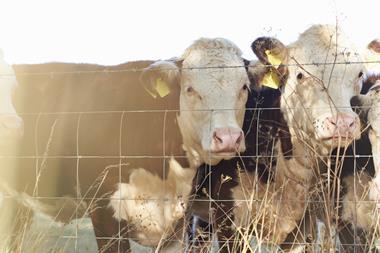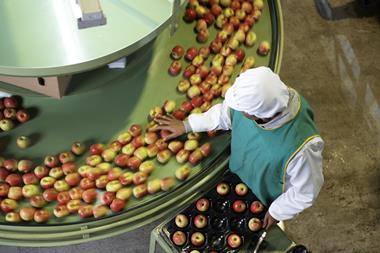
The independent review launched by the NFU into Red Tractor has found the farm assurance scheme is “sound”, with “no procedural breach” in relation to the controversial announcement of its Greener Farms Commitment module.
The governance review, undertaken by consultancy Campbell Tickell, was launched in the wake of a fierce backlash by farmers in October after Red Tractor unveiled the GFC – a voluntary, sustainability-based module separate to core Red Tractor accreditation – that had already been backed by the BRC and major retailers.
The new module, due to go live in April, promised to “meet the needs of the market with a single consistent industry approach” to sustainability accreditation. It aimed to offer farmers, processors and packers one set of common environmental criteria, in reaction to what Red Tractor described as an increase in the “duplication” of environmental accreditation across the food sector.
However, Red Tractor had halted the rollout of the module by the end of October in light of the NFU’s review. Opposition to the new accreditation framework, coupled with suggestions it had exceeded its remit, led many food producers to call for Red Tractor CEO Jim Moseley to resign.
But the review results, unveiled on the eve of the NFU Conference, which kicked off in Birmingham today, argued that Red Tractor’s creation of the GFC was “correctly” part of its remit.
“Red Tractor’s standards are to cover food safety, animal welfare and the protection of the environment. Red Tractor’s activities, in producing its assurance standards, promoting the Red Tractor brand and developing the environmental module, the Greener Farms Commitment, fall full-square within its corporate objects,” Campbell Tickell said.
Does Red Tractor need a jump-start? Meat & poultry category report 2024
Instead, one of the main issues around the announcement of the GFC and the ensuing backlash was the scheme’s often complicated communications.
“Throughout its 23-year existence Red Tractor has always needed to balance pressures and forces – the needs of consumers, retailers, processors, farmers, governments and others – that are often in direct conflict with one another,” the report said. “There has probably not been as difficult a set of operating circumstances as at present.
“We consider that this situation is partly a communication issue – there is of course a great deal of communication and consultation, but its recipients may not always fully understand exactly how a given item may fit into the wider processes under way. In this sense, Red Tractor is perhaps significantly more transparent than other assurance schemes, but given the considerable complexity of the structure, this does not currently always operate in its favour.”
Red Tractor chair Christine Tacon conceded the report sent “a clear message about the level of frustration farmers feel and we need to listen carefully to their views”.
Tacon pledged to “continue to increase our efforts and investment in communicating Red Tractor’s purpose and benefits to farmer members”.
However, she also stressed that the review found that Red Tractor was “perhaps significantly more transparent than other assurance schemes’ and acknowledges that this, together with its representative structure, leads to governance complexity”.
A new, wider review into the UK’s farm assurance framework, run by the NFU and AHDB, is now due to commence.



















No comments yet